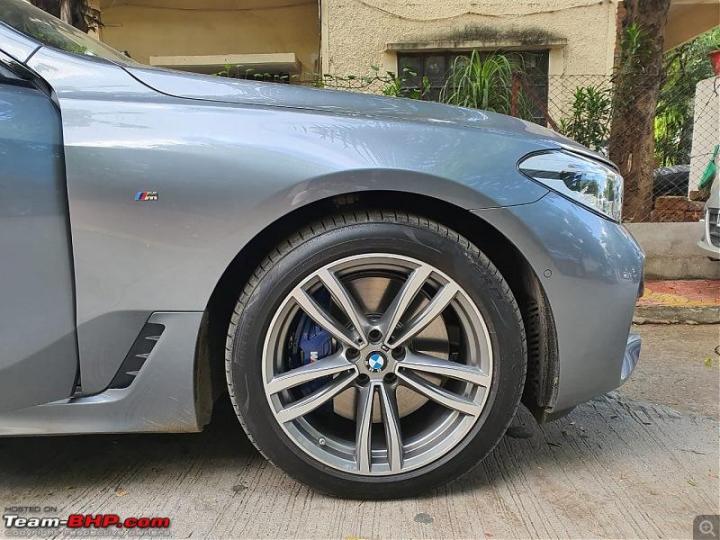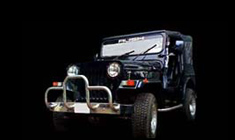News
Are BMW wheels delicate? Multiple owners suffering bent & cracked rims
Two bent rims minimum per year due to lots of highway running. Luckily, I haven't faced a damaged tyre yet.
BHPian Omkar recently shared this with other enthusiasts.
When people say that India is not for beginners, they're not wrong. The road conditions are below sub-par in most areas and monsoons ruin half of the roads every year. As enthusiasts, we are left craving for good roads in India. Given the bad road conditions in the country, it's no wonder SUVs or crossovers are at the peak of popularity.
Today, we're here to talk about the damage these bad roads cause to the wheels and tyres of cars. There’s a lot that can get damaged in a car if you go through a pothole at high speed. Tyres getting punctured is the most obvious, alloy wheels bending or cracking is next and in some cases, even suspension components get damaged. While we can place the blame on the bad road infrastructure and even driver error, you cannot completely discard the possibility that something might be wrong with the alloy wheels. I’m specifically talking about BMW alloy wheels.

Just Google - BMW cracked alloys and you’ll find plenty of posts where people are complaining about their alloy wheels getting cracked or bent. Not just internationally, but in India as well. A quick search on Team-BHP will also give you plenty of results of BMW owners complaining about their alloy wheels getting bent or cracked.
GTO:
My car (BMW 530d with 245/45/R18 at the front and 275/40/R18 tyres at the rear) sees a lot of highway running (two road trips in the last month itself) and wheel repairs are now a bi-annual affair for me.
• Two bent rims minimum per year due to lots of highway running. Luckily, I haven't faced a damaged tyre yet (touches wood).
• 4,000 - 5,000 bucks on repair costs every time. That's 10,000 a year on wheel repair alone.
• Now, a new problem came up. One of my wheels has been repaired so much that it became structurally weak! Sent it to two wheel experts and both of them said "It cannot be repaired further". 8 years of repairing them has taken its toll.
• I plan to keep the 530d for another couple of years. Hence, instead of buying a single wheel, I actually bought a FULL SPARE SET on OLX. What a colossal waste of money, just to have those 18-inch wheels. No choice though = all of my 4 rims have been repaired several times and soon, the others will be unrepairable too. Luckily, the used set of 4 wheels that I bought is flawless and the price was fair (60 grand). But not everyone has the spare storage space.
BHPian samyakmodi:
BMW 630d 245/45/R18 at the front and 275/40/R18 tyres at the rear
In the past couple of months, I have had one alloy wheel bent because of a pothole and 2 have cracked without any bend whatsoever.
For the cracked alloys - The only thing I noticed was they were losing pressure every day. Thought it was a puncture - sent it for repairs only to realise they are cracked!!
BMW alloys are a bit expensive and definitely fragile! At about Rs. 1 lac each - doesn't seem practical enough.
BHPian Nikhilganju:
I had been driving a 2010 525i (17-inch rims) for about 18+ months, and as I expected (while buying a legendary marquee for the amount of almost INR 4 million) the car has been driving very well in general.
I took the car for a service in Jan (the engine oil service alert was being displayed by the car) in which I also pointed out an issue of wheel alignment, since the car seemed to be pulling to the left. When I collected the car the next day in the evening, to my surprise/shock/dismay I was informed that all the four wheel rims of my car had been identified as bent and this was causing a wobbling in the steering wheel at speeds of 80kmph and above.
BHPian androdev:
Air suspension has rubber bellows, they tend to fail as early as within 4 years if you are unlucky. If one of the front pair fails, be prepared for the other one also to fail soon. Rear ones tend to last longer.
BMW low profile RFT tires and cast alloy wheels are not a great combination for Indian roads. Say you noticed a speed breaker too late and end up with an impact: this can potentially cause a crack in alloy without any damage to the tire. Tire damage usually points to hitting something sharp. Moving to tubeless tires, higher profile tires, good quality forged alloy wheels etc can help mitigate the issue.
BHPian Kevinrevvz:
Regarding the tyres, I had several instances of cracked rims and premature RFT tyre wear on my F10 as well. However, the G30's staggered setup is quite unique and with the recent import bans, what about the availability of these?
Dunlop seems to be the most popular amongst G30 530ds but if the grip levels aren't satisfactory, may I know how easy to find and how expensive a set of PS5s are?
It is clear that these aren't one-off cases and there is a problem here. The rims are extremely prone to bending and cracking. And while we don’t have the exact research data it does seem that the primary reason could be that the rims themselves are delicate. Alloy wheel composition plays an important role in the stiffness of the wheel. This could be one of the reasons for the frequent bending and cracking of BMW alloy wheels.
Another contributing factor is the use of low-profile run-flat tyres. For starters, big rim size and low profile tyres is a trend these days that just isn’t sensible on Indian roads. Add to the fact that the strengthened sidewalls of run-flat tyres do transfer the impact from the tyre to the rim.
Negative camber on BMW cars, especially at the rear is referred to as one of the contributing factors on international forums. Negative camber helps the driver get maximum grip on the road and enhances the handling characteristics of the car. However, with a negative camber, the inner side of the alloy wheel is closer to the ground. Combine that with the stiffer sidewall of run-flat tyres and if the tyre pressure is low, the possibility of the rim (inner side) getting damaged is higher.
What do you think is the main reason for the rims of BMW cars bending or cracking frequently? Do share your experience and thoughts.
Here's what GTO had to say on the matter:
BMW India definitely has an issue here. Even Akshay (Euro car expert) told me their stock wheels are too soft/weak and for frequent highway runs, it's better to look at stronger / forged options from the aftermarket.
Weirdly, even bad roads in the city severely bend their rims. It's not just highway potholes taken at high speed. Every time my car goes for a service, 2 rims are bent. Repaired them so many times that 2 wheels became structurally weak and couldn't be repaired anymore. Hence, I bought that extra set from OLX!
And it's not just with one particular style. On my car, the pre-facelift style wheels as well as the facelift-style rims I got have been bent equally. No matter whether it's running on tubeless or run-flat tyres.
Here's what BHPian Axe77 had to say on the matter:
Perhaps this is particularly prevalent on wheels with the lower profile tyres, staggered setups or XL size rims but personally, I’ve not had a single case of wheel/rim damage (touch wood) on my 3GT in the 8.5 years and 65k kms that I’ve owned it.
At least on one instance, I’ve gone through even a tyre blowout (completely blown tyre) as a result of an invisible pothole in pouring rain around Navi Mumbai. Even in that instance, the wheel came out unscathed. I only lost the tyre.
But TBH even I was really scared of such issues on my recent long drive in the GLC. Indian highways are truly not for beginners and especially since I did a lot of my recent drive in dark hours, I was particularly scared of the sudden potholes and unmarked breakers that were hard to sight, more so when it was drizzling or raining.
Here's what BHPian Akshay1234 had to say on the matter:
So I think the main issue here is run-flat tyres. Runflats are certified to drive for 50 miles at 50mph with a full load (as per international quality roads). Hence the sidewalls are really thick and they don't really absorb too much of the bumps. The full shock is transferred to the wheel and suspension.
BMWs also generally give us more performance-oriented sidewall profiles (which have been slowly changing over the last few years). This coupled with the run-flats gives one a very small margin of error. So a really bad bump or pothole can leave one with a bent or cracked rim.
Of course, one solution is to change to tubeless tyres which will reduce the chances of this, and give a better ride. That being said, I personally believe some designs like the F10 LCI 530d alloys were maybe made of a softer alloy, as there are far too many with bends and cracks that I have seen.
Check out BHPian comments for more insights and information.
- Tags:
- Indian
- BMW
- Member Content
- Alloy wheels























